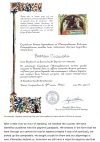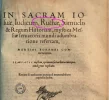Are you trying to suggest that the translators of the Vulgate had better Latin than the officials at the Pilgrim Office who instruct the volunteers and set the practices?
I know, crazy idea right ?
And see below -- I'm afraid David is invariable in Latin too ...
texts in Latin from the 16th, 17th, 18th century
... are unreliable in many ways. The Latin of the Compostela is clumsy, for instance, hence our recent threads discussing that text having some to and fro.
Though FWIW, the Latin text of the Certificate for those completing for "spiritual but not religious" reasons isn't that bad.
Latin stopped being mutually intelligible to any degree with the principle Romance languages after about the 14th Century (modern Sard is a part exception) ; so that it became a dead language from the 15th Century onward, though I usually describe it as moribund rather than dead as such. And even some 14th Century Latin is atrociously bad !!
Nevertheless, the 20th Century
Nova Vulgata translation has :
2: 8 Et ait Booz ad Ruth: “ Audi, filia: ne vadas ad colligendum in alterum agrum nec recedas ab hoc loco, sed iungere puellis meis.
9 Vide et, ubi messuerint, sequere eas; mandavi enim pueris, ut nemo tibi molestus sit; sed, si sitieris, vade ad sarcinulas et bibe de aqua, quam pueri hauserint ”.
In correct Latin, Ruth, like many other Hebrew origin names, certainly NOT all, is an invariable.
(The
Book of Ruth is BTW one of the loveliest Old Testament books, certainly in its
Vulgate translation by Jerome)
Matthew,
Nova Vulgata version, 20th Century Latin :
1 Liber generationis Iesu Christi filii David filii Abraham.
2 Abraham genuit Isaac, Isaac autem genuit Iacob, Iacob autem genuit Iudam et fratres eius,
3 Iudas autem genuit Phares et Zara de Thamar, Phares autem genuit Esrom, Esrom autem genuit Aram,
4 Aram autem genuit Aminadab, Aminadab autem genuit Naasson, Naasson autem genuit Salmon,
5 Salmon autem genuit Booz de Rahab, Booz autem genuit Obed >>
ex Ruth <<
, Obed autem genuit Iesse,
6 Iesse autem genuit David regem.
David autem genuit Salomonem ex ea, quae fuit Uriae,
7 Salomon autem genuit Roboam, Roboam autem genuit Abiam, Abia autem genuit Asa,
8 Asa autem genuit Iosaphat, Iosaphat autem genuit Ioram, Ioram autem genuit Oziam,
9 Ozias autem genuit Ioatham, Ioatham autem genuit Achaz, Achaz autem genuit Ezechiam,
10 Ezechias autem genuit Manassen, Manasses autem genuit Amon, Amon autem genuit Iosiam,
11 Iosias autem genuit Iechoniam et fratres eius in transmigratione Babylonis.
Invariable proper names in
bold, variable proper names
underlined. A few names, notably those ending -am, -em, -es in the Nominative are not clearly invariable simply from their Accusative form being identical, and so are neither given in bold nor underlined. Also note that the woman's name Thamar, invariable here, does have a variable cognate Tamara, which should be preferred on a
Compostela, as the spelling Thamar is found only in the Vulgate and nowhere else. Also take note that Jacob, James, also has a clearly established variable cognate, including in the
Vulgate : Acts
{1:13} Et cum introissent in cœnaculum, ascenderunt ubi manebant Petrus, et Ioannes, Iacobus, et Andreas, Philippus, et Thomas, Bartholomæus, et Matthæus, Iacobus Alphæi, et Simon Zelotes, et Iudas Iacobi. ; which should obviously be preferred (though the name Jacob, as the Patriarch, should probably be invariable on a
Compostela). As to Zara, it's the men's name here, not the women's one ; which
is a variable.
(Don't particularly like that
Nova Vulgata translation BTW, which mistakenly imposes modern punctuation rules as semantically limiting elements, whereas one of the main reasons why the
Vulgate is such a great translation is that its lack of punctuation other than its arrangement in verses allowed St Jerome and his team of translators a far better ability to preserve the double or treble meanings in the original Hebrew and Greek. Not happy either with its use of modern Grammar rules from contemporary Romance languages.)






















